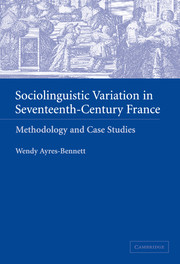Book contents
- Frontmatter
- Contents
- Preface
- Acknowledgments
- List of abbreviations
- 1 Introduction: Methodological issues
- 2 Spoken and written French
- 3 Social and stylistic variation
- 4 Women's language
- 5 Age, variation and change
- Conclusion
- Appendix: Corpora of metalinguistic texts
- References
- Index of concepts
- Index of names
1 - Introduction: Methodological issues
Published online by Cambridge University Press: 22 September 2009
- Frontmatter
- Contents
- Preface
- Acknowledgments
- List of abbreviations
- 1 Introduction: Methodological issues
- 2 Spoken and written French
- 3 Social and stylistic variation
- 4 Women's language
- 5 Age, variation and change
- Conclusion
- Appendix: Corpora of metalinguistic texts
- References
- Index of concepts
- Index of names
Summary
Introduction
Whilst there has been a number of socio-historical linguistic studies of English there is relatively little which is comparable for French. Indeed French scholars have been comparatively slow to embrace sociolinguistics in general, perhaps for two main reasons. On the one hand, we may point to the strength of the normative tradition in France which has perpetuated the stance that anything outside le bon usage is not worthy of serious study. On the other hand, there has long been in France a preoccupation with one kind of variation, namely dialectology and the production of linguistic atlases. This is not to say that there have not been studies of variation, including accounts of past periods of linguistic history; we need only think of Brunot's monumental history of the French language (1905–53), which displays a keen interest in, for example, usage of different genres and registers. Nevertheless, the treatment of variation has often been anecdotal and unsystematic, and has not been informed by the insights of modern sociolinguistic methodology.
The growth of interest in sociolinguistic variation in relation to contemporary French is associated, particularly from the 1970s on, with the work of non-French scholars, notably German (e.g. Söll 1985 [first edition 1974]; Hausmann 1975, Müller 1985) and subsequently British, Canadian and American linguists (e.g. Ashby 1981, 1991; Coveney 1996; Poplack 1989, 1992).
- Type
- Chapter
- Information
- Sociolinguistic Variation in Seventeenth-Century FranceMethodology and Case Studies, pp. 1 - 16Publisher: Cambridge University PressPrint publication year: 2004



